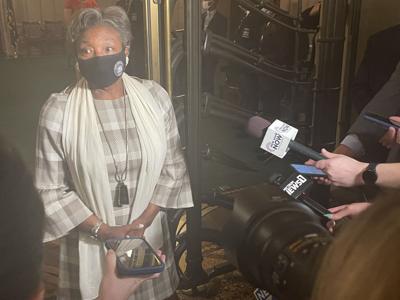ALBANY — New York’s temporary ban on evictions and foreclosures will continue through the beginning of next year, lawmakers decided Wednesday, arguing the state needs more time to distribute billions of dollars in relief to make tenants, small landlords, business and property owners whole amid the COVID-19 pandemic.
Representatives started hours of questioning and debate late Wednesday afternoon to review two bills to extend the state’s eviction moratorium, barring the removal of residential and commercial tenants who could not pay rent due to financial hardships caused by the pandemic, through Jan. 15, 2022.
Legislative leaders have worked to tweak the state law and program since the U.S. Supreme Court struck down a federal moratorium on evictions late last week, ruling the U.S. Centers for Disease Control and Prevention exceeded its authority during the ongoing public health crisis.
“We took pains to make sure to address the area that was struck down by the Supreme Court in terms of making sure that landlords will have an opportunity to at least have their say and deal with various, you know, tenant attestations,” Senate Majority Leader Andrea Stewart-Cousins, D-Yonkers, said after the Senate adjourned Wednesday night. “So we believe that we are on solid ground and again, we are trying to keep people in their homes. This money is flowing from landlords and we understand the pandemic is still very much part of what we are living with. ...We have over $2 billion that people need. This is going to go a long way.”
Senators voted to pass the omnibus bill 38-19, largely along party lines with Republicans voting against the extension.
The Assembly started debate early Wednesday evening, and continued to argue for several hours. Vote counts in the lower house were not available as of press time.
Democrats, who hold a supermajority in both houses, were confident as early as Tuesday night they had the votes to extend the moratorium against evictions and residential foreclosures, including for small businesses, as the state has been slow to administer more than $2.3 billion in relief payments from the COVID Emergency Rental Assistance Program.
The extension is necessary to give the state more time to distribute the funds, Democrats argued, and said curbing evictions is the safest for public health to prevent overcrowding in shelters while COVID-19 numbers surge with the more contagious delta variant and winter approaches.
“Families and small businesses across the state are still reeling from the effects of the COVID-19 pandemic and the economic crisis,” Assembly Speaker Carl Heastie, D-Bronx, said in a statement Wednesday night. “By extending the eviction and foreclosure moratoriums for those suffering financial hardship, we will give New Yorkers the peace of mind that they can stay in their homes while they go through the process of getting rental assistance – either through ERAP or the state Supplemental Rental Assistance fund. The Assembly Majority will continue working to help families and small businesses recover and get back on their feet.”
Session was slated to begin at noon. The bill was not dropped for lawmakers to review until nearly 2 p.m.
Gov. Kathy Hochul called the Legislature to convene an extraordinary session to extend the moratorium, to temporarily amend the Open Meetings Law to allow officials in a public body to attend and vote at meetings remotely until Jan. 15.
Representatives with Committee on Open Government would not comment on the pending legislation Wednesday and the general impact of virtual meetings on government transparency, but said members of public bodies and New Yorkers contacted the committee more frequently during the COVID-19 pandemic about the changed procedures.
Lawmakers also voted to appoint Tremaine Wright as the chairwoman of the state Cannabis Control Board and Christopher Alexander to serve as executive director of Office of Cannabis Management to jump-start the recreational marijuana industry since its legalization this spring.
The governor sets the legislative agenda when calling an extraordinary session. No other topics or legislation were addressed.
Assemblyman Chris Tague, R-Schoharie, questioned sponsor Assemblymember Jeffrey Dinowitz, D-Bronx, on the floor Wednesday night about provisions for small landlords and property owners who cannot reach their tenants behind on rent or had tenants vacate their residence with significant arrears have struggled to complete applications for federal relief. Many have taken out second mortgages, cashed life insurance policies or have had to leave their homes buried in debt.
Dinowitz noted $600 million in federal funds for the Homeownership Relief and Protection Program to assist property owners with mortgage, utility, or home energy payments or other homeownership expenses.
“This is frankly not a debate we should be having right now,” Tague said. “...If that money were dispersed in a timely and competent manner, we’d be in a very different and much less stressful situation than we currently are.”
Constituents have contacted Tague’s office about tenants who continue to go to work have taken advantage of the eviction moratorium, the assemblyman said before voting against the bill.
“While many tenants are responsible and are doing all they can to meet their obligations, I see no reason to continue protecting those who are exploiting the protections that we have put in place,” he said. “If there was a professional can-kicking team in New York state, some in this chamber would make the all-star team. It, to me, is pitiful that we would do this to our own people.
“I’ll be voting no, and I hope anybody with common sense in this chamber does the same thing.”
The state will increase its $100 million for ERAP in the 2021-22 budget to $250 million with a combination of additional federal monies and reallocations of other state funds for tenants who make an income between 80% and 120% the federally set area median income, landlords whose tenants vacated their property without paying rent and landlords whose tenants have not responded to their attempts to make contact.
Stewart-Cousins has spoken with U.S. Senate Majority Leader Chuck Schumer, D-N.Y., she said Wednesday night, and expects the state will need additional relief to make hundreds of thousands of New York tenants and property owners whole.
“Mom-and-pop landlords are our family, friends and our neighbors,” said Sen. Daphne Jordan, R-Halfmoon, adding many of them have not received a paycheck in 18 months and have taxes, insurance and utility bills to pay.
“Sadly, the American dream has become an American nightmare — a nightmare of no money coming in and expenses getting paid ... and a nightmare for the very program that was supposed to be helpful, instead, is hurting them,” she said.
The measures passed Wednesday will amend ERAP’s evictions protections to provide landlords with a path to start eviction proceedings against a tenant who is a nuisance or inflicted substantial damage to a property, and create a due process mechanism for landlords to challenge a tenant’s declaration of financial hardships — directing judges to require residential tenants to apply for the program if their claim is valid.
The state Office of Court Administration will be authorized to access ERAP applications that have limited information, giving the courts the power to separately decide about individual eviction proceedings.
Sen. Phil Boyle, R-Bay Shore, a member of the chamber housing committee, cast doubt Democrats would let the moratorium expire in January 2022 — an election year.
“This thing could go on and on and on,” he said. “That’s why I’m demanding objective criteria for when this eviction moratorium will end.”
The state will provide new $25 million appropriation to fund legal services for tenants facing evictions, under the measure.
The program will also be expanded to residents of localities that opted out of participating in the ERAP and administering their own program, such as the city of Rochester.
Tenants, landlords and property owners who submit an ERAP application and hardship declaration will be protected from eviction for one year from the date the application is submitted to the Office of Temporary and Disability Assistance.









